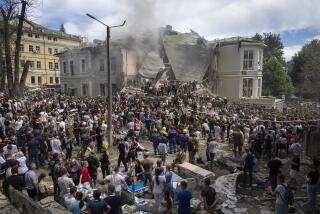4 Peacekeepers Injured in Bosnia Attack : Balkans: Croatian Serbs blamed for missile assault on Bangladeshis. Incident raises concerns about besieged Bihac mission.
- Share via
ZAGREB, Croatia — Four U.N. peacekeepers from Bangladesh were injured, at least one seriously, when their armored vehicle was struck Monday by two antitank missiles believed to have been fired by Croatian Serbs in northwest Bosnia, U.N. officials said.
The attack was the most serious to date on the besieged and ill-equipped Bangladeshi battalion, which has been a sitting target since it replaced French troops in the U.N.-declared “safe area” of Bihac in October.
Three-quarters of the 1,200 Bangladeshi troops have no guns, and the first food and fuel supplies in two months arrived last week. The United Nations wants to withdraw several hundred troops, but Serbs in the breakaway Krajina area of Croatia have blocked them from crossing their territory.
U.N. officials described the missiles as wire-guided rockets that rarely miss their target. Spokeswoman Claire Grimes said the fact that two missiles struck the same vehicle left no doubt that the attack was deliberate.
“Fire broke out as a result of the first impact, and when the soldiers came out of the vehicle, they drew sniper fire as well,” Grimes said. “It is clear the vehicle was targeted.”
Rescue efforts were hampered by the snipers, but the soldiers were evacuated by helicopter late Monday to Zagreb. The attack occurred near the Muslim farm town of Velika Kladusa, about 50 miles north of Bihac. The rockets were fired from Bosnian territory patrolled by Croatian Serbs, who have joined Bosnian Serbs in their assault on Bihac, the United Nations said.
The missile attack raised new concerns about the ongoing Bosnian Serb stranglehold on the U.N. mission there. The sophistication of the weaponry and the direct targeting of peacekeepers once again highlighted the vulnerability of the U.N. troops and the absolute upper hand enjoyed by the Bosnian Serbs and their allies from the Krajina-occupied area of Croatia.
Last week Croatian Serb rebels joined their Bosnian Serb allies to block a visit to the Bihac enclave by British Lt. Gen. Michael Rose, the U.N. commander for Bosnia-Herzegovina. The trip was intended as a morale booster for the trapped peacekeepers, but ended up another humiliation for the beleaguered U.N. mission.
At least two mortar rounds struck the center of Bihac on Monday, injuring a teen-ager, and shelling over the weekend wounded at least five people, according to U.N. reports. Mortar attacks last week killed a woman and wounded seven others in Bihac, the reports said.
“The attacks have been continuing over the past few weeks,” Grimes said. “And the direct targeting of Bihac has been increasing.”
Rose lodged an official protest over the attack on the peacekeepers during a meeting at the Bosnian Serb headquarters in Pale. Rose had gone to Pale to object to a Serbian decision over the weekend to prohibit armed U.N. troops from escorting aid convoys through Serb-held territory.
The results of the meeting were not yet known Monday night, but officials with the Office of the U.N. High Commissioner for Refugees, which provides humanitarian aid in Bosnia, said the decision could grind much of the relief program to a halt.
Even with armed escorts, three food convoys bound for Bosnian government-held enclaves of eastern Bosnia have been held up by Bosnian Serbs since Saturday, while others have been robbed or hijacked. The U.N. relief agency said it would consider allowing convoys to run without escorts only if drivers did not object.
The bad news in Bihac came as Bosnian Serbs lifted a blockade on fuel convoys in Sarajevo, allowing supplies of gasoline and diesel fuel into the encircled capital for the first time in three weeks.
The shortage had grown so severe that some U.N. troops reduced anti-sniping patrols over the weekend while others resorted to escorting civilians through dangerous areas on foot.
The convoy of six French trucks carrying 30 tons of fuel was let into Sarajevo after being detained outside the city for three days. But there were no signs that three Danish fuel trucks, hijacked by Bosnian Serb soldiers Saturday, were about to be released, and U.N. officials warned that the French supplies would last less than a week.
“The fuel got in, but it is not the sort of frustration we would want to go through every time we want to get a convoy in,” Grimes said.
More to Read
Sign up for Essential California
The most important California stories and recommendations in your inbox every morning.
You may occasionally receive promotional content from the Los Angeles Times.













